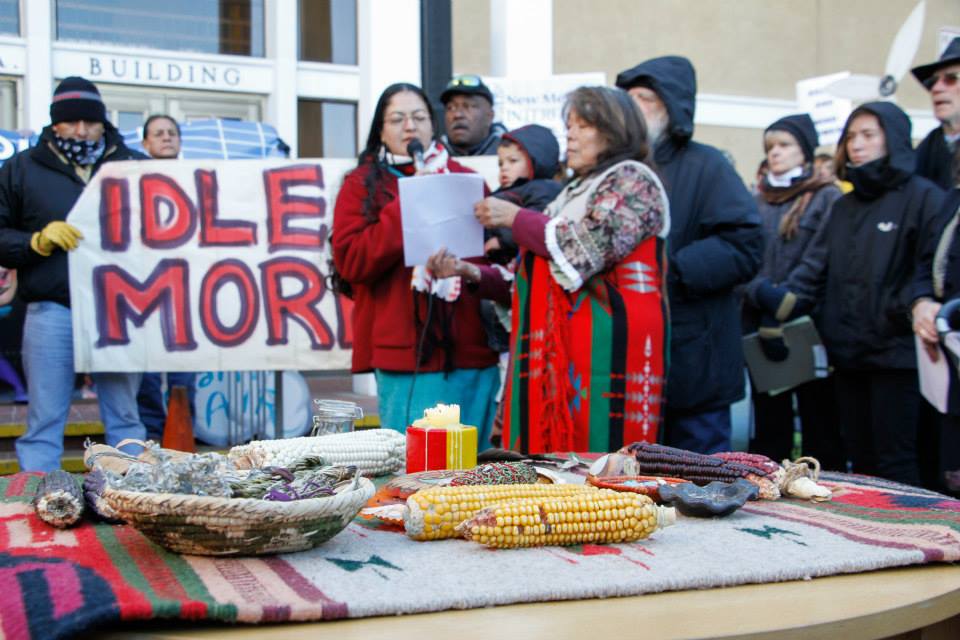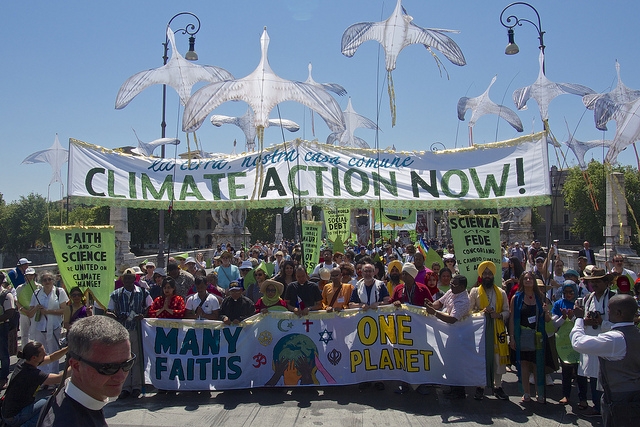NewMexicoWomen.Org and New Mexico Community Foundation have partnered with Tewa Women United (TWU), a nonprofit located in Española, NM, in various ways throughout the years. Mostly recently, they were the recipient of a surprise Chispa Award! The award recognizes organizations that “do a lot with a little” and that help to create sparks of change in their communities. We are humbled by TWU’s longstanding, movement-building community work. In honor of Earth Day, read their feature article by Beata Tsosie-Peña below:
Tewa Women United is made up of four programs that together work toward creating safe spaces for Indigenous women to uncover the power, skills, and strengths they possess to become positive forces for social change in their families and communities. Tewa values are braided together to form the organizational strands that work to end all forms of violence against women, girls, and mother earth.
The full programs that operate within TWU are: The VOICES program, which addresses sexual violence and other trauma; The Yiya Vi Kagindi (Helper of the Mother) Community Doula and Reproductive Justice program; Women’s Leadership and Economic Freedom; A’gin Tribal Prep Healthy Sexuality and Body Sovereignty project, which created a culturally relevant sex education curriculum that is now being implemented and trains youth instructors; Sengi Paa In Vi Po, Journey to Becoming a Man, young men/mentorship project; Our Tsaya In, Circle of Grandmothers; and the Environmental Health and Justice program. Each of these programs is staffed with dedicated, caring women leaders who represent various Tewa Pueblos and other tri-cultural communities of Northern NM. All the program areas do so much towards the healing and wellbeing of Northern New Mexico and further TWU’s mission by drawing from their collective strengths. In light of TWU celebrating 25 years of service to all these diverse populations, they are truly creating change from the inside out. To learn more about these programs, visit their website
As Earth Day celebrations and actions happen worldwide this week, we would like to highlight TWU’s Environmental Health and Justice program (EHJ). The EHJ program is managed by Kathy Sanchez (San Ildefonso), one of TWU’s founding mothers and now an elder, and coordinated by Beata Tsosie-Peña (Santa Clara Pueblo). The EHJ program hosts the annual Gathering 4 Mother Earth event, occurring in early October this year. For 20+ years this program has addressed the environmental violence being enacted upon the Tewa ancestral lands, people, air, ecologies, and sacred waters by the for-profit nuclear weapons industry, which continues to occupy the western Jemez Plateau.
This is accomplished through active involvement in the Communities for Clean Water Coalition (CCW), the Las Mujeres Hablan network, lawsuits, community education, and participation in the permit process and other regulatory avenues. The past couple of years has also included advocacy and working with the National Cancer Institute to formally implement a health study on the impacts from the first nuclear detonation at the Trinity site, where communities now face a cancer rate close to six times the national average. Those impacts spread over the entire state and also led to many exposures in the Pueblo and other downwind and downriver communities during the production leading up to Trinity, before the labs were regulated. This legacy waste and its (lack of) cleanup continue to enact harm to this day. TWU is elevating women’s voices and perspectives on how reproductive and environmental justice intersect on a national and local level, as well as on the disproportionate health impacts on women and children. They provide youth mentorship on these issues through the CCW Youth Council Initiative Project, alongside other CCW core organizations, and engage in arts through activism projects.
To balance that unrelenting work, the EHJ program recognizes the resiliency and strengths that are held in our traditional relationships to ecologies, land, air, water, and seeds. Much of this work is done as part of the Food and Seed Sovereignty Alliance. They are building a non-GMO, heirloom seed bank that will soon be part of a community seed library, reinvigorating fallow lands through community gardens, participating in global Indigenous cultural exchanges, and nurturing the wellness and health that come with being connected to traditional, pre-contact foods throughout all of TWU’s programs. Work is being done to develop a TWU permaculture site garden, as well as make the dream of the Española Healing Foods Oasis (HFO) demonstration garden a reality.
The Healing Foods Oasis will be located on the slope behind city hall in Valdez Park in Española and will be accessible to the multi-cultural, intergenerational communities of the Rio Grande valley. This outdoor educational space will allow people to learn through hands-on community workdays about traditional rainwater harvesting and dryland farming techniques. By helping to take care of an edible, herbal, medicinal landscape within a public park, relationships are reconnected with the ancestral energies of our ancestors, and shifts are happening that help us to collectively rethink what sustainable means in regard to our food systems. Community participation in this project will increase climate change resiliency and adaptability, as well as access to healthy, natural food and medicine, while providing education on how we can maximize use of our precious water resources.
There are many other community collaborators, in addition to the City of Española, who are generously assisting with this project that serves to strengthen networks to better organize around food justice issues. The City is breaking ground on the installation of the irrigation system and earthwork in early May, and the first community workday is being planned mid-month. Other educational workdays will happen throughout the growing season and in the Fall of 2016. The project, like TWU’s organizing principle of the Two-World Harmony Butterfly Model, incorporates balancing western technological knowledge with traditional Indigenous knowledge. Neither is more important than the other, and together they can actually be a powerful solution to many of the environmental problems that exist.
If you would like to donate time, materials, or purchase a tax deductible $500 sponsorship that comes with a permanent plaque recognizing a business, individual or memorial for this exciting project, please contact beata@tewawomenunited.org. All volunteers for workdays are most welcome! The end result is going to be truly beautiful and add positive ripples that then widen to the larger community. Thank you/Kunda Wo Ha New Mexico Community Foundation and NewMexicoWomen.Org for honoring this vital work and for this Chispa Award! It is support like this that smooths the path for this work to continue and for positive change to happen.

